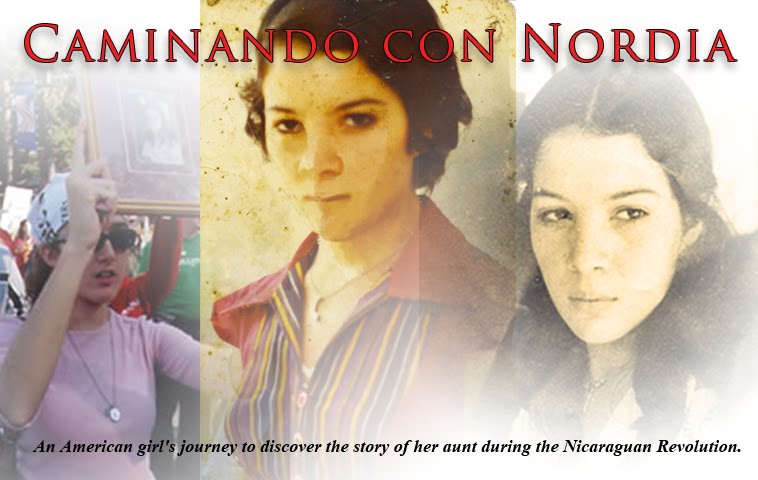An another issue that has popped up and seems to haunt me revolves around the Contras. To grossly over-simplify things, you can look at the Nicaragua revolution in two parts: first with the uprising and over-throwing of the Dictator Somoza and secondly with the counter-revolt fighting for control over the newly freed country. The first half seems pretty straightforward: get rid of the bad guy oppressing the people. The second half is incredibly more complicated and laced with political tension. I just wanted to avoid the second war altogether. Nordia's story doesn't lead to that time. Nordia died before the first revolution had ended. Unfortunately, I am learning time and time again that I can't view history in a narrow lens to suit my fancy. I can't pick and choose what parts are more "interesting or entertaining" if we are even allowed to describe these difficult times with such terms.
Since Meiselas's documentary returns her to Nicaragua ten years after the initial uprising, she is able to get some of that disenchanted counter-perspective. According to one woman,
"Many mothers of those who died regret the deaths of their children. They fought so much -to die- and for nothing. For a Nicaragua without a real triumph, a Nicaragua exhausted-that's what we have now."Is that how my grandmother felt about the loss of her youngest daughter? I know she denied the Sandinistas a photo of Nordia to use for the memorial of those who died on Hill 110. Did she resent what the war did to her family? Susan goes on to note the growing distance between those running things and those who fought. One person, however, was torn and disturbed about the current disappointment. He felt that the price of revolution, the blood, suffering and pain, was to great to betray it. He explained,"The revolution did not fail us. The revolution didn't fulfill all of its promises." He said the revolution was clipped of its wings and not able to grow. Susan spoke with various people who were upset with their current situation. Some felt they were naively hopeful for better while others knew the poverty would remain constant but thought the freedom was enough of a difference to matter. It was really interesting to hear the different view points.
What I was most surprised to witness was the authentic emotion from former national guard members. To me, they were the enemy, pure evil. But as Susan interviews them they become human again. I was shocked that I could even be capable of sympathizing with someone from the guardia. A saw a man in tears about losing the war, honestly believing he was fighting on the right side. He broke down expressing,
"We were used just as the Sandinistas were used. We were caught in a war game between the powers. The Russians supplied the Sandinistas. The United States supported us. And they started to play with us in a way which was, after a point, dishonest...you become nothing more than a puppet."
A puppet. A puppet in a very sad play where outside nations pulled the strings. The Nicaragua people fought for themselves, not any political ideology. Unfortunately there were too many powers invested with the outcome of this country. Everyone wanted to claim Nicaragua as their own pawn on the global chessboard.
And so I must accept that the story of the past is not so black-and-white but thick with gray. I have to be careful how I present some things because of how it will unfold later. I remember one of my uncles mentioned that something I wrote before felt wrong or ignorant. It was too ideal whereas he knew the dark reality. Another time a different uncle said something about my sister being innocent with optimism. It was almost as if we were falling into the trap of romanticizing history and heroizing the flawed. I know they might be burdened by the haunting past of their experience which influences their perception, yet it was worth taking note. Watching the documentary reaffirming this lasting bitterness. They even went as far to mention that this wasn't a war like "the American movies where the hero walks in." There aren't clear good guys and bad guys and history should not be depicted as a feel-good action flick.
Normally we are told we must understand the past to better approach the future. In the case of studying the Sandinista uprising and uncovering Nordia's story, I'm going to have to come to grips with the future to authentically portray the past.

War in complicated
ReplyDeleteLife is complicated
My brothers are complicated